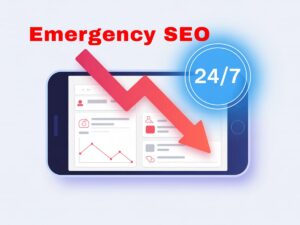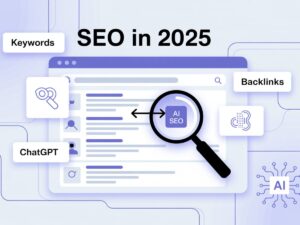“In the AI era, your content must not just speak keywords — it must speak meaning.”
Search engine ranking is evolving at lightning speed. What once worked—keyword stuffing, thin articles, and backlinks alone—is no longer enough. Today, AI algorithms power the way Google and other engines evaluate, surface, and summarize content. If your content isn’t built for AI’s semantic, user-focused models, it may struggle to rank. In this post, I’ll explain how AI algorithms impact rankings, what you must do to stay visible, and how Maznur Rahman (SEO expert, Rangpur, Bangladesh) helps clients in Vancouver, Texas, Utah, and Dhaka stay ahead.
What Are AI Algorithms in Search Engines?
AI algorithms in search use machine learning models and natural language processing (NLP) to interpret meaning, context, and user intent. These models analyze vast data — links, content signals, user behavior — and continuously learn which results satisfy users best.
How AI Algorithms Change Traditional Ranking Signals
1. From Keywords → Context & Intent
Rather than matching exact keywords, AI models analyze semantic relationships and entity inference. They detect whether your content truly addresses a user’s intent, beyond surface terms. (Often referred to as “semantic SEO” or leveraging LSI / related terms)
2. User Behavior Signals
AI learns from click-through rate, dwell time, bounce, and return visits — treating them as feedback loops to elevate content that genuinely satisfies.
3. Entity / Semantic Understanding
AI models treat content as networks of entities (people, places, concepts). They use relationships (co-occurrence of terms) and semantic clusters instead of just matching words.
4. Personalization & Geolocation
AI tailors results by location, device, user history, and preferences. A user in Vancouver might see different content than someone in Dhaka for the same query.
5. Zero-Click Answers & AI Overviews
Increasingly, search results show AI-generated summaries, featured snippets, or answer boxes (so users don’t click further). To win visibility, your content has to be structured for extraction.
Answer Engine Optimization (AEO) & AI Summaries
Answer Engine Optimization (AEO) focuses on creating content that search engines and AI systems can directly cite as answers (without sending users elsewhere).
To optimize for AEO:
- Use question headings (H2 / H3) and answer immediately.
- Provide concise 1–2 sentence definitions / answers before elaborating.
- Use FAQ sections, list formats, How-To schemas.
- Add FAQ schema or HowTo schema markup.
Best Practices: Optimizing for AI-Driven Rankings
| Practice | Why It Helps | Tip |
| Clear question headings | Signals AI to source answers | “What is AI ranking?” rather than vague titles |
| Concise answer first | AI often uses first 40–60 words | Front-load key insights before detail |
| Semantic / related keywords | Helps AI understand context | Use synonyms & related concepts naturally |
| E-E-A-T & authority | AI values trust signals | Author bio, credentials, citations |
| Schema / structured data | Helps AI parse content structure | FAQ, HowTo, Q&A markup |
| Monitor & update | AI / SERP evolve quickly | Use tools / logs to see AI excerpt changes |
Case Example: Local SEO with AI Overviews
Imagine you have a page: “AI SEO services Vancouver”. Under a traditional model you might optimize for “Vancouver SEO.” Under AI, you add a Q&A section:
Q: Why hire AI SEO services in Vancouver?
Answer: AI SEO helps your site align with modern ranking engines by optimizing context, user behavior signals, and entity relevance.
That brief answer (40–60 words) is placed before deeper content. If Google creates an AI Overview for “AI SEO Vancouver,” your page might be used as the snippet — drawing trust and clicks.
Challenges & Pitfalls to Avoid
- Keyword stuffing / over-optimization — that’s penalized by modern AI models
- Shallow content / lack of depth — cannot compete with in-depth answers
- Ignoring user signals like bounce or dwell
- Outdated technical SEO problems (slow pages, no schema)
Conclusion & What’s Next
AI algorithms are reshaping how ranking works: from matching keywords to interpreting meaning, user behavior, and authority. To stay visible, your content needs to be built for AI: structured, semantically rich, and answer-focused. If you’re in Vancouver, Texas, Utah, or Dhaka — let Maznur Rahman audit your site, optimize your content, and help you rank in the new AI paradigm.
📞 Contact me
- Website: maznurrahman.com
- Email: seoexpertmaznur@gmail.com
- Phone: +880 1767-091490
Let’s optimize for the future together.
FAQs
AI-based ranking uses models that analyze context, entities, and user behavior — not just keywords and backlinks. Traditional SEO relied more on matching terms and link signals; AI ranking adds semantic and behavioral dimensions.
Yes — overuse of repetitive keywords (especially in unnatural ways) is flagged by AI models as low quality. Contextual, topic-rich writing wins.
It varies. Some changes appear in weeks (especially snippet / AI excerpt changes); deeper ranking uplift may take 3–6 months depending on competition, page authority, and content quality.














